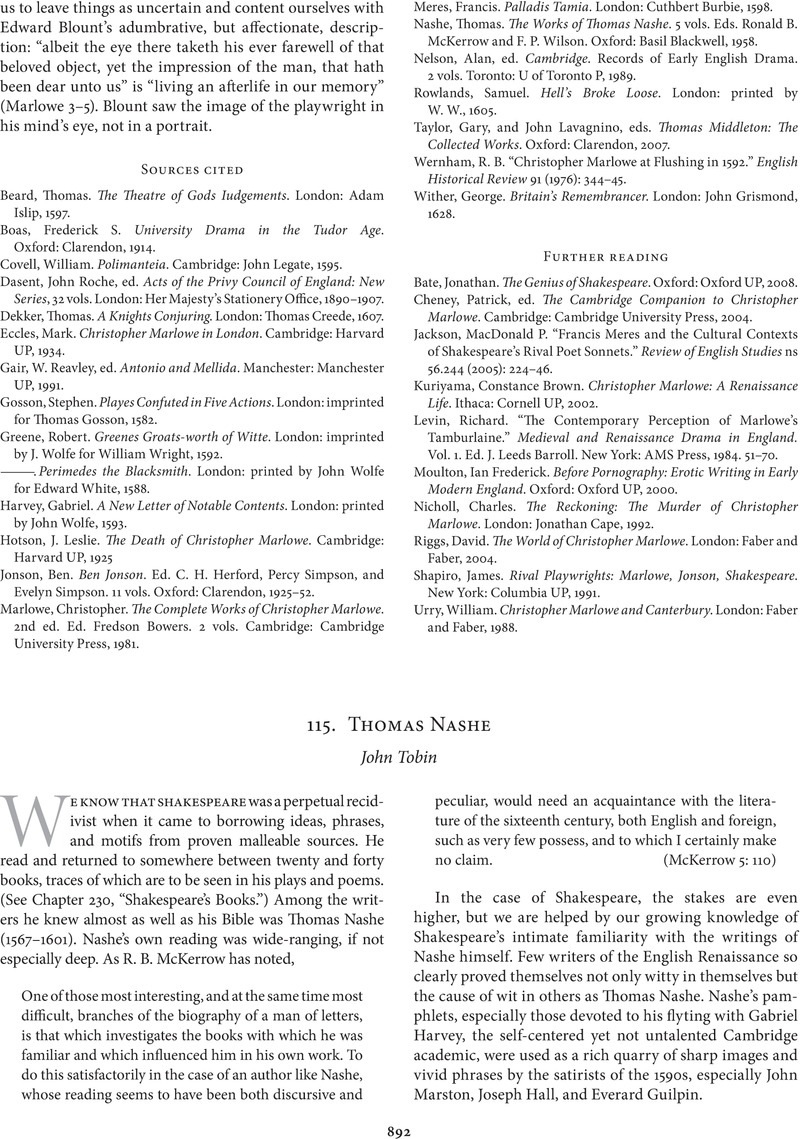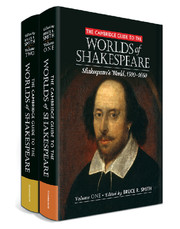Book contents
- The Cambridge Guide to the Worlds of Shakespeare
- Frontispiece
- Frontispiece
- The Cambridge Guide to the Worlds of Shakespeare
- Worlds of Shakespeare
- Copyright page
- Contents
- Illustrations
- Contributors
- Preface
- Acknowledgments
- Abbreviations
- Part I Mapping Shakespeare’s World
- Part II Theater
- Part III Language
- Part IV Science and Technology
- Part V Printing, Publishing, Textuality
- Part VI Visual Arts
- Part VII Popular Culture
- Part VIII High Culture
- Part IX England, 1560–1650
- Part X Religion
- Part XI Medicine
- Part XII The Historical William Shakespeare
- Part XIII Shakespeare’s Fellows
- Introduction
- 113 Robert Greene
- 114 Christopher Marlowe
- 115 Thomas Nashe
- 116 Thomas Kyd
- 117 Richard Tarlton
- 118 George Peele
- 119 John Lyly
- 120 Richard Burbage
- 121 John Heminges and Henry Condell
- 122 Edward Alleyn and Philip Henslowe
- 123 Nathan Field
- 124 William Kemp
- 125 Robert Johnson
- 126 Robert Armin
- 127 Ben Jonson
- 128 John Fletcher
- 129 Thomas Middleton
- 130 John Webster
- Part XIV Shakespeare’s Early Reception (to 1660)
- Part XV International Encounters
- Part XVI Making the Scene
- Part XVII Shakespeare as Cultural Icon
- Part XVIII Shakespeare and Popular Culture
- Part XIX Translation
- Part XX Changing Technologies of Stage Performance
- Part XXI Audiences
- Part XXII Production History
- Part XXIII Printing and Reception History
- Part XXIV Shakespeare and the Book
- Part XXV Shakespeare and the Critics
- Part XXVI Shakespeare and the Performing Arts
- Part XXVII Shakespeare and the Visual Arts
- Part XXVIII Shakespeare and Media History
- Index
- References
115 - Thomas Nashe
from Part XIII - Shakespeare’s Fellows
Published online by Cambridge University Press: 17 August 2019
- The Cambridge Guide to the Worlds of Shakespeare
- Frontispiece
- Frontispiece
- The Cambridge Guide to the Worlds of Shakespeare
- Worlds of Shakespeare
- Copyright page
- Contents
- Illustrations
- Contributors
- Preface
- Acknowledgments
- Abbreviations
- Part I Mapping Shakespeare’s World
- Part II Theater
- Part III Language
- Part IV Science and Technology
- Part V Printing, Publishing, Textuality
- Part VI Visual Arts
- Part VII Popular Culture
- Part VIII High Culture
- Part IX England, 1560–1650
- Part X Religion
- Part XI Medicine
- Part XII The Historical William Shakespeare
- Part XIII Shakespeare’s Fellows
- Introduction
- 113 Robert Greene
- 114 Christopher Marlowe
- 115 Thomas Nashe
- 116 Thomas Kyd
- 117 Richard Tarlton
- 118 George Peele
- 119 John Lyly
- 120 Richard Burbage
- 121 John Heminges and Henry Condell
- 122 Edward Alleyn and Philip Henslowe
- 123 Nathan Field
- 124 William Kemp
- 125 Robert Johnson
- 126 Robert Armin
- 127 Ben Jonson
- 128 John Fletcher
- 129 Thomas Middleton
- 130 John Webster
- Part XIV Shakespeare’s Early Reception (to 1660)
- Part XV International Encounters
- Part XVI Making the Scene
- Part XVII Shakespeare as Cultural Icon
- Part XVIII Shakespeare and Popular Culture
- Part XIX Translation
- Part XX Changing Technologies of Stage Performance
- Part XXI Audiences
- Part XXII Production History
- Part XXIII Printing and Reception History
- Part XXIV Shakespeare and the Book
- Part XXV Shakespeare and the Critics
- Part XXVI Shakespeare and the Performing Arts
- Part XXVII Shakespeare and the Visual Arts
- Part XXVIII Shakespeare and Media History
- Index
- References
Summary

- Type
- Chapter
- Information
- The Cambridge Guide to the Worlds of Shakespeare , pp. 892 - 899Publisher: Cambridge University PressPrint publication year: 2016

